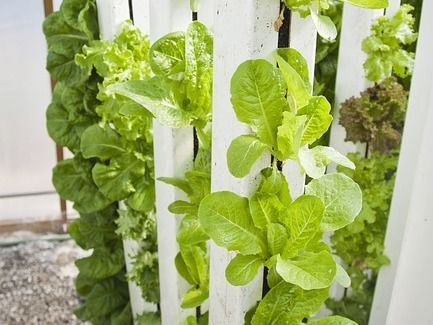Every second consumer would buy products from vertical agriculture
Göttingen agricultural scientists investigate acceptance of novel floor cultivation systems
Rising population numbers and poorer weather conditions due to climate change make it difficult to produce sufficient healthy and fresh food. Vertical agriculture could make a contribution to solving this problem. Here the vegetables and fruit are grown on top of each other in tiers. This system requires neither direct sunlight nor arable soil, as the plants grow in nutrient solutions in artificial light or daylight. A team of scientists from the University of Göttingen has investigated the acceptance of vertical cultivation systems. The results have been published in the journal Sustainability.

symbol image
BrightAgrotech/ Pixabay
The researchers from the Department of Marketing for Food and Agricultural Products interviewed around 500 consumers from Germany about various vertical cultivation systems. The evaluation included a fridge-sized appliance for private use, a medium-sized greenhouse in supermarkets and a vertical farm that can be built in former industrial buildings. Environmental friendliness is an important issue for 81 percent of consumers. Only seven percent had already heard of vertical agriculture. It is interesting to note that, nevertheless, half of the participants would buy fresh products from vertical cultivation systems. It also shows that the larger the system, the greater the probability that it will be considered sustainable. The small systems for household use were rated worse overall.
"Our results show that the development of vertical cultivation systems should focus in particular on sustainability. Only systems that are truly environmentally friendly will convince consumers," says Kristin Jürkenbeck, PhD student and lead author of the study. "The topic of sustainability is becoming increasingly important for consumers in all areas of life, this is made clear by public discussions and must not be ignored by companies," says Prof. Dr. Achim Spiller, head of the Marketing Working Group for Food and Agricultural Products.
Note: This article has been translated using a computer system without human intervention. LUMITOS offers these automatic translations to present a wider range of current news. Since this article has been translated with automatic translation, it is possible that it contains errors in vocabulary, syntax or grammar. The original article in German can be found here.
Original publication
Other news from the department science

Get the food & beverage industry in your inbox
By submitting this form you agree that LUMITOS AG will send you the newsletter(s) selected above by email. Your data will not be passed on to third parties. Your data will be stored and processed in accordance with our data protection regulations. LUMITOS may contact you by email for the purpose of advertising or market and opinion surveys. You can revoke your consent at any time without giving reasons to LUMITOS AG, Ernst-Augustin-Str. 2, 12489 Berlin, Germany or by e-mail at revoke@lumitos.com with effect for the future. In addition, each email contains a link to unsubscribe from the corresponding newsletter.


























































